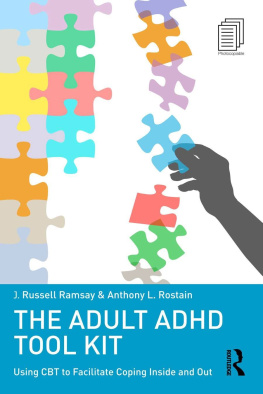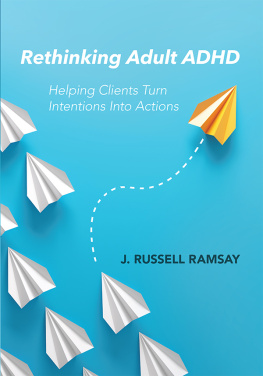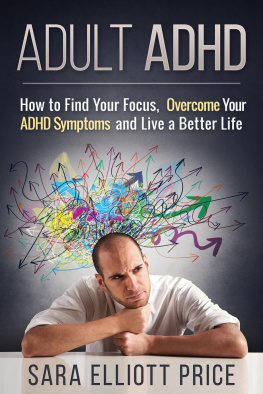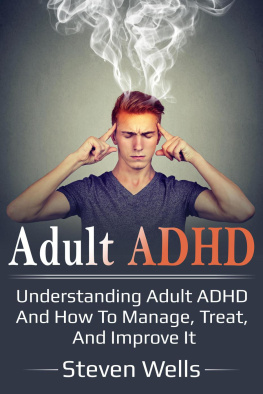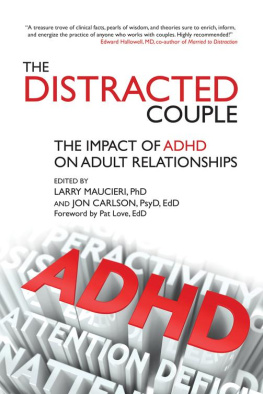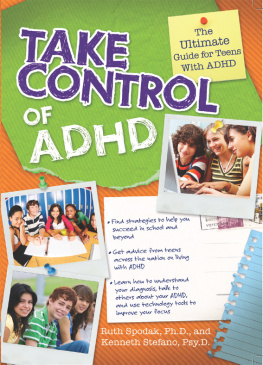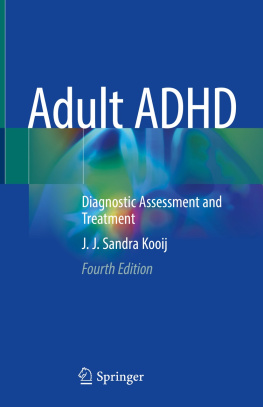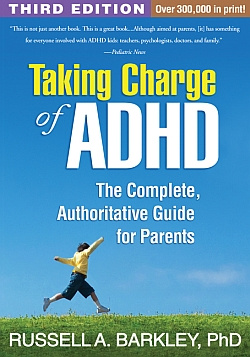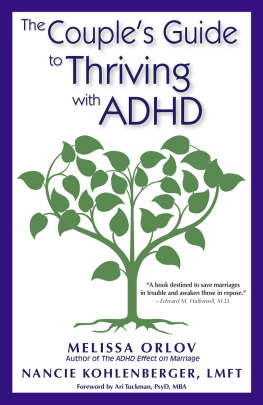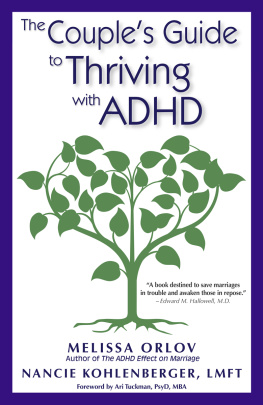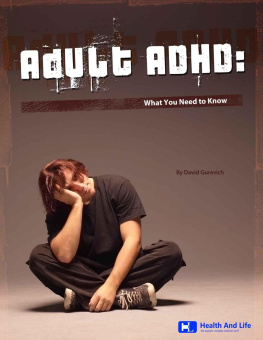Preface
Benjamin Franklin said, You may delay, but time will not, and lost time is never found again. We are two mental health professionals by trade, a psychologist (J. Russell Ramsay JRR) and a psychiatrist (Anthony L. RostainALR), who specialize in assessing and treat- ing adults with Attention-Deficit/Hyperactivity Disorder (ADHD) through our Adult ADHD Treatment and Research Program at the University of Pennsylvania, the institution founded by Franklin. Most patients who seek out our program want to be better able to set out and follow through on their plans, including academic and work tasks, keeping up with errands and personal affairs, and any number of other personally relevant endeavors. The solution seems as simple and obvious as a well-known advertising campaignJust do it! This maxim is not unfamiliar to adults with ADHD; in fact, the core underlying dif- ficulties that define ADHD are directly related to the mechanisms that allow us to do it.
Discussions of ADHD focus a great deal on the A and the H, with the name of the diagnosis and resulting acronym being somewhat misleading. Yes, A and H represent its symptoms, but they do not adequately describe the ADHD syndrome. ADHD is cur- rently understood as a disorder related to poor self-regulation or self-controladults with ADHD have problems turning their intentions into the actions that are required to handle many of the demands of daily life. More specifically, it is difficult for adults with ADHD to proactively and consistently develop, organize, and enact and follow through on plans over time for which there is a future (but not immediate) pay off. Instead, ADHD adults repeatedly face the stress of looming deadlines or crisis situations that result from putting off tasks, only being provoked to action by an emergency situation on par with trying to defuse a ticking time bomb.
Think of all the stories and fables we learned as children about the virtues of planning ahead and persevering on a task, such as the little pig that built a house of bricks, the tortoise who keeps a steady pace over a long race with the hare, religious teachings about the benefits of self-restraint and self-control (Thou shalt NOT...), etc. Each lesson involves deferring immediate gratification for a greater but distant reward. A famous study of self-control led by Walter Mischel had children sit alone in a room with a plate of sweet treats. The children were told that they could have a single treat of their choice, but if they could wait without eating it until the examiner returned to the room, they could earn a second one. Some children, despite the promise of greater reward, suc- cumbed to the temptation to eat the single treat, losing out on the bonus; other children were able to resist temptation long enough to earn the reward of a second treat. The main finding of interest in what has come to be known as the marshmallow study is even 40 years later (Mischel et al., 2011).
Although the lessons and solutions seem straightforward and have been reinforced by grandparents, parents, teachers, bosses, fairy tales, cautionary tales, etc., self-regulation is more multifaceted than it seems. There are many fundamental skills that provide humans with the capacity to do what they want to do or need to do when they need to do it. These skills, known as the executive functions, operate in an exquisite choreography to help us navigate the myriad demands of adult life. Hence, ADHD is currently understood as a disorder of impaired executive functions. That is, the farther in the future the reward for a behavior lay, the greater difficulty an adult with ADHD will have performing the neces- sary component steps in the here-and-now, thus decreasing the likelihood of achieving the payoff (despite full awareness of the consequences). Alas, the penalties for poor self- control in adulthood are much steeper than the loss of a marshmallow.
ADHD also involves distinct motivational deficits inasmuch as motivation is consid- ered the ability to generate emotions that help you to engage in a task without rely- ing solely on an immediate reward or consequence. Adults with ADHD have difficulties accomplishing jobs that range from setting up a retirement fund (Ill get around to it later. I have time.) to something as immediate as mowing the lawn on a weekend after- noon (Ill get around to it later. I have time.).
As was mentioned earlier, we established and have operated a specialized clinical program for the assessment and treatment of adult ADHD since 1999. An established treatment for ADHD is pharmacotherapy, the use of medications to treat the core symptoms of developmentally inappropriate levels of inattention, impulsivity, and/ or hyperactivity. Similar to obtaining corrective prescription eyeglasses, effective medication treatment of ADHD reduces the symptoms of ADHD, such as improving the ability to sustain attention and to reduce restlessness and impulsivity. Although an effective and safe treatment for most adults with ADHD, medications alone do not necessarily improve behavioral functioning and well-being in ones day-to-day life. That is, you may be less prone to distraction and fidgetiness while on a medica- tion, but you will not spontaneously complete your income taxes or get started on a monthly report for work.
The other treatment we provide at our program is cognitive behavioral therapy (CBT), a specific form of psychotherapy that has been adapted to address problems commonly encountered by adults with ADHD. The cognitive in CBT refers to the thoughts, beliefs, and attitudes that affect how we perceive and react to events, as well as our self-perception. Negative thinking has no causal influence on having ADHD, although it often develops as a consequence of growing up and living with ADHD and trying to manage its effects on your life. Said differently, you did not develop difficulties organizing and following through on tasks because you have negative thoughts about them; however, the repeated difficulties you have experienced because of ADHD have likely given rise to pessimistic outlooks about these tasks, which, along with even residual symptoms of ADHD, create a double whammy and make it even harder to follow through on them, that is, insufficient motivation.
The behavioral in CBT refers to ones actions and to the therapeutic process of devel- oping a more adaptive behavioral repertoire with which to cope with ADHD. Once more, having ADHD does not result from the fact that self-control behaviors were not adequately emphasized by your parents when you were a child or from eating too much sugar-coated cereal. Indeed, individuals with ADHD know quite well how to handle the situations that cause them problems. Ask a grade school student with severe ADHD what he should do if he knows the answer to a question asked by the teacher during class, and he will correctly answer, Raise my hand and wait to be called on by the teacher. The crux of the problem is that ADHD interferes with the students execution of the behav- iors required to obey this rule during class.
CBT for adult ADHD, as in other talk psychotherapies, involves regularly scheduled office meetings. By necessity, these meetings occur outside the environments in which individuals with ADHD experience the difficulties that bring them to treatment. The necessary solutions for the common problems related to managing ADHD are obvious and logicaluse of a planner, getting started earlier on tasks, spending time organizing files, etc.but the problem is carrying out these solutions in your daily life at the point of performance.
In a nutshell, our goal for this tool kit is to share the ways we have tried to make the cop- ing tools for adult ADHD sticky so that they will stay with you and you will be able to use them to positive effect in your day-to-day life.
The purpose of this handbook is to serve as a coping resource for adults with ADHD in order to increase the consistent use of effective coping strategies that will improve ones ability to manage his or her daily affairs. Of course, the notion of a self-help or do-it-yourself book for adult ADHD, a condition that we have already identified as a problem related to poor self-regulation (i.e., core difficulties with self-help), might seem oxymoronicor maybe just moronic. The executive function/motivational deficit definition of ADHD we described would make it seem that ADHD interferes with your ability to make changes in a do-it-yourself fashion. We do not expect that simply read- ing about what you need to do will make you more productive. If that were the case, any one of the excellent books on adult ADHD already on the market would have sufficed.

